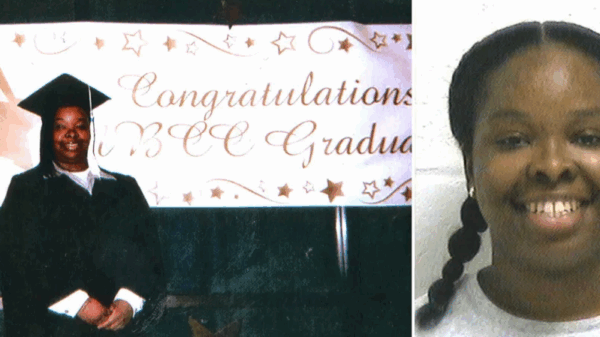OKLAHOMA CITY — After serving 2 years in jail and 13 years in prison, domestic violence survivor and mother, Tondalao Hall is coming home.
Hall was 19 years old when she was arrested for the injuries found on her two youngest children after she took them to the hospital for treatment. She was living with the children’s father and her then-boyfriend, Robert Braxton, and had been the victim of Braxton’s verbal, physical, emotional, financial, and sexual abuse for years.
Braxton was given a plea deal of 10 years probation with time served. He has never spent a day in prison. Hall signed a blind plea and was sentenced to 30 years in prison. Her sentence has kept her away from her children at a time when they most needed a mother, and away from her community, at a time she most needed support.
After years of grassroots advocacy and legal representation from the ACLU of Oklahoma, on October 8th, 2019, Hall received a unanimous vote by the Oklahoma Pardon and Parole Board to recommend her for commutation to Governor Stitt. Tomorrow, she will walk out of prison and into the arms of the family and friends who never left her side.
“My mom and dad told me I was getting a little sister when I was 7. Growing up, Toni followed me around everywhere. She tried to do everything that I did. She named her first son after me, which touched my heart,” said Jeffery Hall, Tondalao Hall’s brother. “But going through the times when she was incarcerated has been hard. Ever since the commutation hearing when the Board voted in her favor, I feel like that 7-year-old who just can’t wait for when this sister of mine is coming home.”
“The kids and I are extremely excited to have Toni back at home where she belongs,” said Cynthia Wells, Tondalao Hall’s cousin and guardian of her children. “I can’t wait to see her relationship with her children blossom. I am excited to pick up family traditions that we started before she went to prison. She has missed so many holidays and important family events that I just want her children to experience having both their mothers home.”
Hall’s children have remained in contact over the years and played a vital role in advocating for the release of their mother. In fact, letters from the children were included in Hall’s commutation packet and sent directly to Governor Stitt.
“First and foremost, I want to thank God for making a way and for keeping me safe and sane during this season of my life,” said Hall. “Secondly, for all the people God has placed in my life, my children and my family for sticking by me. Time and space cannot accommodate the list of people who have loved, helped, and supported me through all of this, so, to everyone who has, thank you and God bless you!”
Like many states, Oklahoma’s "failure to protect" law is often imposed on women in households with an abusive partner. The likelihood of a domestic violence victim being murdered by their partner jumps to about 75% higher than if they choose to remain in the relationship. Leaving an abusive partner is dangerous and often a huge emotional lift--these laws disregard that risk.
“While we rejoice in Hall’s freedom as she exits the prison gates, we are haunted by the knowledge of all the other women who remain incarcerated for failing to stop the crimes of their abusers and recognize the countless other families torn apart by Oklahoma’s failure to protect laws,” said Megan Lambert, ACLU of Oklahoma staff attorney. “This is just the first step toward addressing the injustices of the failure to protect statute. We look forward to the day that all the other women wrongfully imprisoned for the crimes of their abusers follow Hall to freedom. As we celebrate Toni’s homecoming, we hope Governor Stitt, members of the Pardon and Parole Board, and the elected officials who have helped advocate for her release will join us in making sure Oklahoma never again rips a mother away from her children to spend time in prison for the crimes of her abuser.”
Related Content

The Heartbreaking Case of Tondalao Hall
Stay Informed
Sign up to be the first to hear about how to take action.
By completing this form, I agree to receive occasional emails per the terms of the ACLU’s privacy statement.
By completing this form, I agree to receive occasional emails per the terms of the ACLU’s privacy statement.
